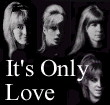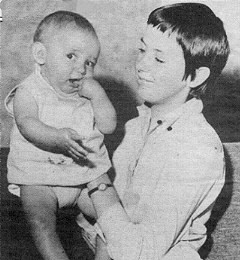 On the 10th of February 1964 at Billinge Hospital near Wigan, Philip Cochrane was born weighing 5lb 150z, a small but healthy baby. At this time Paul McCartney was on the Beatles' first tour of the US.
On the 10th of February 1964 at Billinge Hospital near Wigan, Philip Cochrane was born weighing 5lb 150z, a small but healthy baby. At this time Paul McCartney was on the Beatles' first tour of the US.
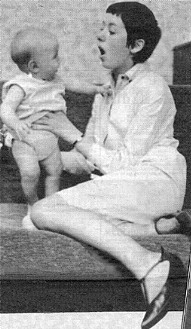 Innocent 15-year-old Anita met her first boyfriend, Paul McCartney, while walking down Matthew Street in Liverpool one day with a mutual friend.
Innocent 15-year-old Anita met her first boyfriend, Paul McCartney, while walking down Matthew Street in Liverpool one day with a mutual friend.
"It was two weeks before my 16th birthday that I met Paul. I was going to the Cavern Club and Paul was walking along Matthew Street with John Lennon. A friend introduced us. We had a brief chat and then shook hands. It was quite unusual for anyone to shake hands in those days. I was just a kid really. Paul kept hold of my hand and I immediately fell for him. He was quite something. He was a charmer. He was a bit on the bold side compared to the lads I knew - the local lads at home. He seemed a bit more sophisticated and sure of himself. I liked him right away. I thought he was really nice. My ideas of the perfect man were different then. You have to remember I hadn't had another boyfriend before Paul. I was just a kid, a virgin. He asked me if I could go to the Tower Ballroom in New Brighton on Friday night."
Anita agreed to what would be her first date on the night of her 16th birthday.
"It was my 16th birthday that day. I can even remember what I was wearing - a grey gymslip dress with a black polo-neck jumper and black tights. My hair was blonde and I used to curl it so it flicked out at the bottom. We watched Paul, John, George Harrison and Pete Best, who was The Beatles drummer at the time, on stage at the Tower Ballroom, then went to a cafe called Joe's in Liverpool. A lot of people from the Liverpool scene met up there after they'd been playing. We drank coffee and chatted for a few hours and then Paul asked me if I wanted to go to a party."
The party in question didn't turn out to be the kind of party that innocent young Anita was used to, but she was already falling in love with Paul and quickly agreed.
"He didn't really have a party in mind, but everything was called a party back then, I realised later on. Life was just one big party. We went back to a bedsit with two friends. It was apparent what the score was. I should have said; 'Right, I'm going.' But I let myself into it. You have to realise I really liked him. He was everything. He'd told me he loved me and I said I loved him - I did. He just seemed special to me. I thought he was a knight in shining armour. Every girl must think that when they fall for someone, mustn't they? I remember waking up with him. I went to bed with my clothes on and they were all crumpled up. I was too shy to take them off. I was so shy. I can't believe I stayed there and didn't go home. I must have been mesmerised. I was really nervous. I was just 16 that night. I told him I'd never done it before. He reassured me to make me feel more relaxed, but I was very tense. I did it because he wanted to and I liked him. I just wanted to please him. I'd fallen for him and would have done whatever he told me to do. I didn't know anything about it and was nervous whether I was doing the right thing. I thought he liked me, that he wouldn't be there with me if he didn't like me. I thought that night was the start of something. But I came back down to earth with a bump the next day. He dropped me at the bus-stop and said 'See ya.' He didn't arrange to see me again. I think he realised I was just a kid. I didn't cry until later when I was at home."
Anita wasn't at all put off by this incident as she was already infatuated with Paul, and since that night she'd gained access to the Beatles' inner circle and began to spend a lot of her time at the Cavern club with their friends, waiting for any sign from Paul that he returned her affection.
"We were part of their set and I was besotted with Paul. Although, after that first night I was just one of many girls there falling all over them. We'd be there at the back of the Cavern chatting with them and I'd hope Paul would single me out. He could pick up who he wanted, and he knew I was available. He'd give me a little smile or dedicate a song to me. We used to go back to John Lennon's flat in Gambier Terrace for parties and get-togethers. Sometimes, Paul and I would kiss and cuddle, sometimes there was no ending up with anyone. I wasn't a groupie. Paul was the only person I'd go with - not that there was any loyalty between those guys. I remember once, we'd gone back to John's flat and for some reason Paul wasn't there. They used to play silly, immature games like spin the bottle for a bit of entertainment. The bottle spun round for me to be with John. But I wouldn't have anything to do with it. He knew the score - that I was in love with Paul. John was married at the time to Cynthia but it was very hush-hush. She used to be very discreet. She occasionally came into the Cavern, but mostly John kept her right off the scene. He used to enjoy the girls, like the others."
Other friends from the Cavern remember clearly how things were between Paul and Anita.
"Anita was part of the crowd who hung out with them. She wasn't Paul's girlfriend, more a close friend of the crowd. She didn't go out with Paul but she would hang about and talk to him. I suppose there was a group of people who were close to The Beatles and everyone knew each other. They'd been friendly since the beginning. They were lovely girls and each of them had a favourite in the band. Paul was friendly with a lot of them. Anita was extremely beautiful She wore jeans and had a blonde, elfin haircut. She used to go to the concerts a lot and was very soft on Paul. The lads would give the girls a lift home and sometimes things happened. But it wasn't a love affair."
Paul and Anita slept together a second time at John's flat, and although she found herself being treated exactly the same way the following morning as she had the time before, the event left her feeling even more fond of him.
"I was just picked up and dropped when he chose. In total, I had sex with him only three times. But, in the 16 months I was with him, I never went with anyone else. Sometimes he ended up with other girls. It was just something I had to accept. It hurt, but I just had to accept it. The second time I was with Paul we didn't have a date or anything. It was just a pick-up. At first, I thought it proved he loved me because he'd come back to me. But I soon realised I was being naive. By this time, The Beatles were becoming more popular. I still hoped I'd end up with him, but deep down I knew it was becoming unlikely. They were getting famous and there were girls throwing themselves at them. I knew in my heart that eventually their fame would take them away from Liverpool - take him away from me. I think a lot of people knew it was going to happen."
Anita slowly began to realise that her rose-tinted view of their "relationship" was not a reality for Paul. He was becoming famous and would soon be able to choose any girl in Britain that he wanted. For Paul, theirs was only a sexual relationship, something which would soon be made clear to the naive and besotted young Anita as his times in Liverpool became shorter and he found himself with less chances to humour her in order to get his way.
"Towards the end of their time in Liverpool, Paul started to change. He became colder. He treated our relationship as purely a sexual thing. He made it clear it was nothing special. I remember the last time we were together. I was walking home with a friend and he drove past and picked us up. We went to John's flat. My friend was with John and I was with Paul. That was the night I believe I became pregnant."
Anita was 17 when her son was conceived at the end of April 1963, and only two weeks after that she saw Paul for the last time at a friend's flat, still totally unaware that she could be carrying his child. As the two were joking around together, Paul implied that Anita was easy, deeply upsetting her and provoking her to throw a cup of coffee over him.
"He made it clear, in no uncertain terms, how unimportant I was to him. He was so hard-faced. I couldn't kid myself any more. he dared me to throw the coffee over him, so I did. He slapped me and called me names. I jumped up and ran home. I was devastated."
In reaction to the devastating discovery that Paul didn't care for her, Anita found herself with another man, but unfortunately once the pregnancy became apparent, none of the signs pointed towards this other man being the father... a situation which deeply upset Anita after the way Paul had treated her.
"After Paul and I rowed, I had a one-night stand with another man. I wish he was the father and all of this would go away."
Anita had stopped kidding herself that Paul truly cared for her, but would continue to kid herself for a following three months that her increasing nausea and other physical symptoms didn't indicate that she was pregnant. She was working as a copy-typist in Liverpool at the time and had neither the family support or financial capability to bring up a child.
"I didn't know I was pregnant at the time. It was a while before I allowed myself to think I was. Physically, it was obvious, and eventually my mum challenged me about it. I was feeling nauseous. I passed out a few times. Then I got very depressed. Philip was conceived at the end of April, but I blocked it out until I was about four months pregnant. There was never any doubt in my mind that Paul was Philip's father. When my mum and grandmother found out I was pregnant, I thought I'd write to Paul and tell him what had happened. I was that sure the baby was his. I didn't get a reply, so my mum and I went to see Paul's father. He was really nice. He gave us a cup of tea. But then he said; 'Paul says he doesn't know you. That's all I can tell you.' I was very hurt I thought: 'Great, he doesn't know me. That just about sums up our relationship'."
Although Paul didn't admit to knowing the girl, the Cavern crowd remembered her and Paul going around together and knew the story well. A former cloakroom attendant from the Cavern Club remembered the way things were back then.
"She was just an ordinary girl who went to the Cavern. She was a friend of Paul and then she became pregnant. It was common knowledge among the Cavern set that Paul was the father."
In the early 1960s it was deeply scandalous to have a child out of wedlock, and even more scandalous if the father would not support the mother in any way. The only solution for young unmarried British girls was to sneak away to mother-and-baby homes far away from anyone who knew them. There they would waste months waiting for their pregnancy to become more apparent under the disapproving eyes of their nurses, while being persuaded that their only logical option was to give their child up for adoption. This is exactly what happened to Anita.
"I went to the mother-and-baby home. Everything was going to be hushed up. It was very traumatic having to go to this place. I tried to cut myself off from any emotion towards the baby. I remember at the time, we had a television in the home and I used to see Paul and the others on the news broadcasts. He was with Jane Asher by then and I was on my own."
 On the 10th of February 1964 at Billinge Hospital near Wigan, Philip Cochrane was born weighing 5lb 150z, a small but healthy baby. At this time Paul McCartney was on the Beatles' first tour of the US.
On the 10th of February 1964 at Billinge Hospital near Wigan, Philip Cochrane was born weighing 5lb 150z, a small but healthy baby. At this time Paul McCartney was on the Beatles' first tour of the US.
"I can remember them bringing my new baby to me after he'd been born and this woman said: 'Feed him.' I looked at him and fell in love. I thought he was gorgeous and I really wanted to keep him. He had the same dark eyes as Paul. I just told my mum I couldn't part with him."
Anita was one of the lucky unmarried mothers whose family accepted her decision to keep the child - but they accepted it only on the condition that they pursue Paul for maintenance money as they hadn't enough money to support the child themselves. Paul was already excessively famous by this time and therefore very hard to contact. After a constant stream of un-answered letters and telegrams to him, Anita's family finally visited lawyer D.H. Green in Liverpool during March of 1964 to try and get her the financial support required for her unborn child. D.H. Green turned out to be a friend of David Jacobs, the Beatles chief solicitor and friend of Beatles manager Brian Epstein. Green informed his friend that the girl and her family seemed quite honest and decent and had no intention of hurting Paul or his career. In fact it seemed that Anita's only concern was getting enough money from Paul to buy a pram for her baby. As John Lennon's wife Cynthia remembers, as soon as The Beatles truly entered the big time.
"It appeared from the evidence on the solicitor's desk at this time that Paul had been a bit of a town bull in Liverpool. Claims for paternity suits rolled in. He found himself in great demand in more ways than one. Whether the claims were true is anybody's guess."
The first offer made to Anita was £2 10s a week to support the child until he was 21, and Anita went home to work out if she could survive on that.
"We saw a lawyer, Dennis Green, and that started everything. Paul was still denying anything and that hurt me. I remember being upset that I could not put his name on the birth certificate. I didn't think it was right that Paul was denying the baby a name. I did want it to be recognised who Philip's dad was. So I gave him Paul as a middle name. After we saw the solicitor, I went home and started working out what I'd paid for the pram and nappies to see if I could survive on £2 10s. A friend of my mum's came round and asked why I was totting up a shilling for this and a shilling for that. He said Paul could afford at least another pound a week, so we went back to the solicitor to see if there was any chance of getting a higher payment. I had my baby to think of. Something had to be done. The love for your baby changes your whole life. I was just being practical, thinking of my child."
After the threat of legal action, NEMS Enterprises - the company run by Beatles Manager Brian Epstein - decided to offer Anita £5 a week maintenance. It had been explained to Paul that the more money was given to Anita, the more likely it was that the newspapers would latch onto the story and decide he was without doubt the father. While they were deciding just how much money to offer her, Anita's solicitor made some of his own decisions. In the 1960s there was no DNA testing, so it was decided that the best action was to subpoena Paul to court and request a blood test, and at the same time they applied for an affiliation order. Just days before the order was issued, a new offer came through from NEMS of a one-off payment of £5.000 which Anita was advised to accept. But this fantastic amount of money came with conditions. Anita must renounce all claims on Paul and must never bring Paul to court, imply that he was the father of her child or reveal the terms of the agreement. If she did, she would have to pay the full amount back and according to British law at the time would be unable to get more than £2.10s a week for the maintenance and education of her child as that was the maximum amount which could be claimed.
"The solicitor put in a request for more money and we got this offer of a one-off payment of £5,000. That was more than a house in those days. We were expecting only an extra pound a week. I felt terrible signing that contract. I sold out. I should have made Paul acknowledge Philip as his or at least challenge me. But I was 18 years old. I was worried about my baby. I just didn't realise the implications."
The money was paid out by Brian Epstein's company NEMS, not Paul himself, and so the situation was something staff there at the time were aware about. The company's "Mr-Fixit", Alistair Taylor, remembers the incident well.
"The guys were playing so many gigs a week. They were belting round the bloody country. They were healthy young males, so of course there were girls. There is no surprise in that. There were a lot of paternity claims, but this one was different. Brian paid out because it was true, or as far as we knew it was true. There was no DNA testing then, but Paul knew there was a strong chance the child was his. If it had come out it could have been disastrous. The Beatles were marketed as the pure group, the group mothers would let their teenage daughters go to watch. The Rolling Stones were the black and The Beatles were the white. Why do you think the marriage between John Lennon and Cynthia Powell was kept a secret for so long? In those days, teenage pop idols didn't get married. This was worse - an illegitimate baby. Come on. So we did it. We paid. In was known as Mr Fixit and I know I was involved in the payment... Paul didn't pay the money, Brian did. It came out of the management company. The money was then docked from Paul's wages. There were no other payments like this in the nine years I was with The Beatles."
Once the money had been handed over, Anita was bound by the terms of the agreement not to say a word about Paul being the father of her child. Her family and their friends were not restricted by this agreement though, and some of them decided to take matters into their own hands. When the band returned to Liverpool for the Northern Premiere of their film A Hard Days Night on the 10th July 1964, leaflets were being circulated accusing Paul of being a "cad" for not supporting his son, and lengthy poems about the child were circulated to the newspapers.
"My name is Philip Paul Cochrane, I'm just a little boy... In spite of all her lovin' we got no thanks from him, It seems he loved my mother, just long enough to sin; Besides his lust, she took his money to compensate a lie, But Mr Paul McCartney, Dad, you make mother cry."
This small bout of publicity did nothing to harm Liverpool's conquering heroes, but it can't have done Anita and her little boy much good either now that the whole city knew their names and their unfortunate situation. Philip's Uncle, Ian Pillans, remembers the situation at the time, noting that Anita believed that she had been treated fairly but that as Philip grew up the situation began to really affect him.
"There was a settlement and she got some money off him. I remember Brian Epstein, the manager of The Beatles, coming to my grandmother's house where Anita was living. Anita got the money off him and as far as she was concerned that was the end of the story. But it's been difficult for Phil. His father's never acknowledged him. But there's no question that he's Paul's son. You only have to look at the kid."
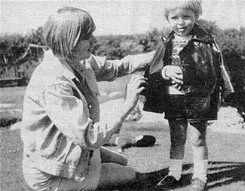 A family friend, Joyce Jackson recalls Anita and her little boy.
A family friend, Joyce Jackson recalls Anita and her little boy.
"The baby was the spit of Paul. Anita doted on him and took him around with her everywhere. I remember her feeding him yoghurt in a coffee bar we all used then."
Friends of Philip's remember clearly how hard it was for him growing up with this big dark secret that all the locals around him seemed to know about.
"It was common knowledge in Liverpool that Paul McCartney was Phil's dad. Everyone knew, but people didn't rib him about it because we liked him and we knew he didn't like it. It would even be embarrassing having McCartney pictures up on the wall or having a Beatles track playing when he came over. He completely rejected his father, wanted nothing from him and wouldn't ever talk about him. I suppose with dads you can hate them and maybe still love them. Phil always knew who his dad was."
Anita gradually put her life back together and in January of 1975 she married a hairdresser named Christopher Howarth. The couple bought a house together in a middle-class area of Liverpool where they brought up Philip and two children of their own. Philip took on his step-father's name and was popular at both local school's he attended - Crosby Road North Junior School and Manor High. A former bandmate of Philip's remembers both his popularity and the musical talents he might have inherited from his father.
"Phil was a great lad, a good-looking lad. He was quiet but popular and always had friends and girlfriends. He was a talented musician. He played guitar and keyboards and he had a great voice. We used to be in a band called the Rastafarouts - based on reggae music. That was just messing about, though, nothing serious. We would certainly never play anything by The Beatles. Phil wouldn't have liked that. It was a few lads from the Railway Pub, where we used to go. We'd just meet at someone's house, sit down with the instruments, smoke a bit of weed and play. Phil never spoke about Paul or tried to cash in on his dad. He wasn't like that. It was something he preferred people didn't talk about."
A close relative confirmed this.
"He's a gentle, sensitive person who's been hurt enough. It's strange, really - there are a lot of people who'd be shouting from the rooftops if they believed Paul McCartney to be their father. Phil just wishes he wasn't."
Anita remembers her son being a happy wonderful child when he was little, but trouble was soon round the corner.
"He was such a lovely child. He was no trouble at all. He used to be very creative - artistic. And he'd look at me with those big brown eyes and get away with murder."
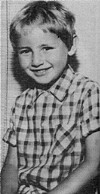 When Philip was eight years old, his mother showed him the contract she'd signed with Brian Epstein that was dated 23rd April 1964 which stated that she was "not to make any allegation or statement to any person under any circumstances that or to the effect that Paul McCartney is the father of said child."
When Philip was eight years old, his mother showed him the contract she'd signed with Brian Epstein that was dated 23rd April 1964 which stated that she was "not to make any allegation or statement to any person under any circumstances that or to the effect that Paul McCartney is the father of said child."
"My mum showed me a few photos of her with The Beatles and showed me the legal agreement. It was typed out on quite thick paper, rolled up and had a fancy bow on it. I remember seeing Paul McCartney's name, Brian Epstein's and my mum's. It had a big seal stamped on the bottom and it was red. It said we should never talk about the contents of the agreement or we would be taken to court. It was a horrifying realisation. I believed then that I was a mistake and should never have been. I've always known who my dad was. I remember my Gran pointing to The Beatles on the telly and saying: 'That's your dad.' When I was a little boy I used to think I'd like to meet him. I thought naively that maybe he'd turn up one day and be a proper dad. But then I saw the agreement and it really seemed he wanted nothing to do with me. I knew then there was no way on Earth he ever wanted to see me."
Seeing the contract caused a great change in young Philip. The previously good little boy started to rebel in the classroom and then begin to play truant, spending his time in nearby Southport where he would hang out in the pubs and sea-front arcades.
"I was in the lowest classes, I didn't see the point in working. I thought I knew it all. There was this anger inside me. I didn't want to know McCartney - I don't even like his music. He was nothing in my life so he didn't affect me. I used to tell myself that I wasn't the only one in the same boat. There were other kids I knew at school who didn't know their fathers. I'd tell myself: 'Forget it. get on with your life and maybe one day he will try to make contact, maybe one day he will recognise you.' But that was when I was younger. As I grew up, I knew it was never going to happen. I faced the hard fact that there was no way he was ever going to want to get to know me. I can't remember exactly how I felt as a kid, but I've never really wanted to know him. If he'd ever thought anything of me, he'd have come to me - wouldn't he? In my teens I did think about the fact that he was my father. As you grow up you so think about things like that. Everybody seemed to know about it in our part of Liverpool, anyway. Sometimes I'd look at myself in the mirror to see if there was any resemblance between him and me. To tell the truth, I couldn't see it. I also thought that if I picked up a guitar I'd just magically be able to play it. I was wrong about that as well. I told a few close friends about it. I said: 'Paul McCartney's meant to be my dad. I can't believe it.' I remember telling one girl and she burst into tears. But I've never bragged about it. I've never looked up to him. I wasn't proud of him. If I'd thought he was a really great musician and thought everything was great about him, then maybe I would have been proud. But I didn't feel like that. I remember people putting on records by McCartney's group Wings and I just wasn't into it. I've always thought John Lennon was the talented Beatle, not McCartney."
When Philip was 19-years-old, a former executive of NEMS called Peter Brown, published a book on The Beatles called "The Love You Make: An Insider's Story Of The Beatles" which told the story of Anita and Philip. The press soon tracked them down.
"When it went into the papers the first time I was really sickened, I hated becoming public property in that way. I like to keep myself to myself. Especially when it's for being the son of someone who doesn't want to know you. It's not like winning the Lottery or scoring the winning goal in the Cup Final. It's not nice."
The shock of the situation caused Philip to go completely off the rails, and soon he had joined Liverpool's drug-culture.
"I'd always smoked a bit of marijuana and I'd taken a bit of LSD and had a wild time. Then it progressed to heroin. That went on for a while. I'm not making excuses - I was stupid. At the time, heroin was a big thing in Liverpool. All my circle of friends did it. We didn't inject it or anything. We burnt it in foil and inhaled it. It was what they call 'chasing the dragon'. I got badly hooked on it, really badly. After about a year, I told my mum. She couldn't work out what I was doing because I had started stealing from everywhere, even from home. I had turned into a rather nasty character. I was doing things I wouldn't even usually think about. I had serious cravings. I was on smack for two years. Mum tried every way she could to get me off it, but I was just getting worse and worse. I went to see counsellors and they told Mum to lock her doors to me. I'd come home but she wouldn't let me in and I stood in the garden and thought: right, what can I do now?"
Philip joined a rehabilitation centre in West London where he remained for two and a half years, leaving when he'd finally overcome his addiction. Anita was extremely worried about her son and searching for any way she could to help him. She turned to religion and was so thankful for the support given to her that she became a Jehovah's Witness. She also decided to take drastic action to rid Philip of the torment he'd felt since discovering the situation with Paul McCartney.
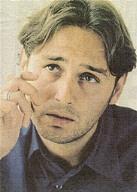 "The fact that Paul might be Philip's father had caused us nothing but trouble. Right from the start people knew about it. Photographers would be trying to take pictures of him in his pram. Then, when he was 19 and it all came out in the papers, I started getting some really sick hate mail. Fans can be really weird. John Lennon had been shot just a few years before and I was worried for Philip - worried what weirdos might do to him and worried about what he was doing to himself. I just felt Philip would feel better if I told him Paul wasn't his father. There was the possibility his father was someone else and I thought he'd be better off believing that. I just wanted the whole thing to go away. I said I'd lied to him and that someone else was his dad. Then I destroyed everything that was to do with the case, everything - the deed and photographs - anything relating to Paul. I honestly did it for my son. I thought he would feel better and get on with his life."
"The fact that Paul might be Philip's father had caused us nothing but trouble. Right from the start people knew about it. Photographers would be trying to take pictures of him in his pram. Then, when he was 19 and it all came out in the papers, I started getting some really sick hate mail. Fans can be really weird. John Lennon had been shot just a few years before and I was worried for Philip - worried what weirdos might do to him and worried about what he was doing to himself. I just felt Philip would feel better if I told him Paul wasn't his father. There was the possibility his father was someone else and I thought he'd be better off believing that. I just wanted the whole thing to go away. I said I'd lied to him and that someone else was his dad. Then I destroyed everything that was to do with the case, everything - the deed and photographs - anything relating to Paul. I honestly did it for my son. I thought he would feel better and get on with his life."
His mother's words did help Philip for a short while and he began to straighten himself out.
"I felt as if a great weight had been lifted off me. It really was a breath of fresh air. People would still ask me if it was true and I was able to say no. It was great to feel that a man I hated had nothing to do with me."
In the mid 1990s when Philip was about thirty, he decided to finally leave behind all the gossiping in Liverpool and make a new start in London. There he worked as a salesman for two plant hire companies and drove a delivery van. He moved in with a hairdresser named Melanie Randall and the couple were described by neighbours as being a quiet and happy couple who just liked to keep to themselves. In 1997, when Philip was 33 years old and working as a Lighting Technician in North London, he proposed to Melanie and they bought a house together. Just as his life seemed to be getting in order for the first time, his story was sold by a close relative to a Sunday newspaper in Britain for a five figure sum. When the story broke, both Anita and Paul issued statements denying that Paul was Philip's father... neither of them denied the affair had taken place or that a payment had been made to Anita and nether would say whether DNA tests had been carried out. Although Paul and Anita could try and cover things up with the press, Philip was another matter and his life was once again in turmoil.
"It was terrible. None of my friends in London knew anything about it. I was just Philip Howarth to them. Then I was on the front pages of all the newspapers - McCartney's illegitimate son. I've felt suicidal. I live a private happy life. I don't like everyone knowing my business. I haven't been able to go back to work since all this blew up. I feel so embarrassed. When I knew the story was going to come out again, I phoned mum and said we'd ask McCartney to do a DNA test to show I wasn't his son and then everyone would stop writing about it. It was then she told me that he probably was my father. She said: 'Philip, be careful. The DNA tests could very well show that you are Paul's son.' I can't tell you how horrible that was. I'd put everything behind me and now the uncertainty was back. I can understand why my mum told me what she told me. She was trying to protect me. But can you imagine how I felt? For the first 20-odd years of my life I thought Paul McCartney was my father and I hated it. Then was told he wasn't and was happy - really happy. Now I'm told the chances are that he might be. It keeps going round in my head - is he or isn't he? - and it's terrible."
After being badgered by the press continuously since the story came out, both Philip and Anita decided they needed to get things settled once and for all. After 33 years of keeping silent, according to the terms of the £5,000 payment she had received from Beatles manager Brian Epstein, Anita finally gave an interview to the Daily Mail newspaper in an attempt to tell her own story and help her son to find the proof of whether his father really was Paul McCartney. Previously to this, on the 14th of May 1997 Philip's solicitor sent a letter to Paul asking that he take part in a DNA test to see if he was Philip's father. Philip said at the time:
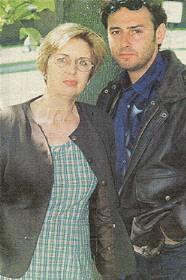 "I just want to know. This thing has dogged me all my life. I left Liverpool and thought I'd put all the speculation behind me. I was happy. I'd just bought a home with my fiancée and we were saving to get married next year. Then the story was sold to a Sunday newspaper and the whole thing blew up again. It's like a volcano that keeps erupting. I just want to get back to leading a normal existence. I believe only a DNA test can settle this once and for all and stop the speculation. I hope he's not my dad. I don't like the man. I don't like what he's done to my mum. He treated her like a rag doll that he picked up and threw down whenever he wanted... At least if we do the test, the speculation will end and I can just live a quiet life. He must know that I don't want to know him. I'm never going round to his house. No way. No nice little chats on the patio. Even if he didn't want to have a test but he admitted that what my mother said was true, then I'd have a bit more respect for him. I wouldn't hate him any more. But I don't think he will."
"I just want to know. This thing has dogged me all my life. I left Liverpool and thought I'd put all the speculation behind me. I was happy. I'd just bought a home with my fiancée and we were saving to get married next year. Then the story was sold to a Sunday newspaper and the whole thing blew up again. It's like a volcano that keeps erupting. I just want to get back to leading a normal existence. I believe only a DNA test can settle this once and for all and stop the speculation. I hope he's not my dad. I don't like the man. I don't like what he's done to my mum. He treated her like a rag doll that he picked up and threw down whenever he wanted... At least if we do the test, the speculation will end and I can just live a quiet life. He must know that I don't want to know him. I'm never going round to his house. No way. No nice little chats on the patio. Even if he didn't want to have a test but he admitted that what my mother said was true, then I'd have a bit more respect for him. I wouldn't hate him any more. But I don't think he will."
The story soon died down when neither side would take part in any further discussions with the newspapers, and the three of them were allowed to work out their problems privately. No further statements have been made to the press either confirming or denying that Philip is Paul's son.
SOURCES: Interviews with Anita and Philip during May 1997, various newspaper articles about Anita and her son, various Beatles and Paul Biographies including The Beatles A Diary by Barry Miles and A Twist Of Lennon by Cynthia Lennon.
